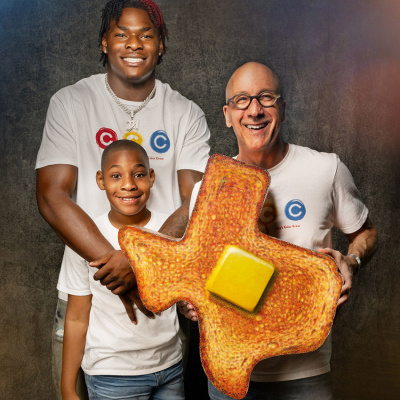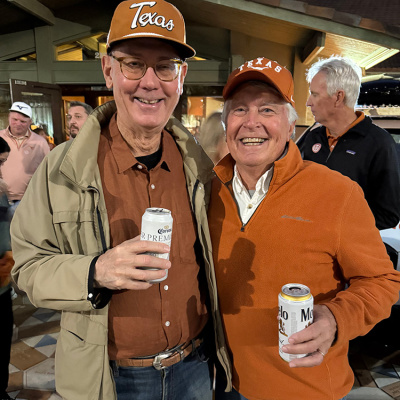Cedric Benson: An Appreciation

I told my wife that a Texas great died on his motorcycle this weekend without naming him; I wasn't sure the name Cedric Benson would mean much to her, a non-football-fanatic. When she got the alert that Benson and his companion, Aamna Najam, BS ’14, PhD ’19, were struck and killed by a minivan on Mt. Bonnell Road in West Austin on Saturday night, she turned to me, incredulously, and said, "You never told me it was Cedric Benson."
Perhaps I underestimated the reach of the Longhorn star running back. It's silly to think that the man who arrived at Texas already a star and left a top-5 NFL pick could be under-appreciated, but in a complicated life like Benson's, nothing is cut and dry.
Benson, who died at 36, has a legacy that is hard to define in conventional terms. Any Longhorn fan born before 1995 knows the four straight 1,000-yard seasons (the only time this has ever happened at Texas), the 283 yards and four TDs in a Thanksgiving slaughter of Texas A&M during his junior season, and the incredible comeback against Oklahoma State during his final season. He is second all-time in rushing at Texas; he is one of three Longhorns to win the Doak Walker Award; and he is still 10th all-time in rushing in NCAA history, ahead of college greats like George Rogers, LaDanian Tomlinson, and Herschel Walker. In 2014, he was inducted into the UT Hall of Honor.
But because Benson played at Texas from 2001-04, he gets a little bit lost in Longhorn lore, even though he is fresh in our memories. Former teammate Rod Babers told Spectrum News that they used to call Benson "Little Ricky," because of his resemblance to Ricky Williams. Babers insisted that Benson was a unique individual, but with a nickname like that, it's already an uphill battle living in the shadow of a Heisman winner, taking the reins just two years removed from Williams' senior season. And still, Benson forged his own identity as a fierce rusher at Texas, even if the dreadlocks drew comparisons to his predecessor.

The comparisons were so fervent that the April 25, 2005, issue of ESPN the Magazine featured a shorn Benson, fists clenched, grimacing, with the coverline: "I'm Not Ricky!" That the magazine felt the need to include his name in brackets conveys a further indignity: that people wouldn't know who Benson—one of the greatest rushers in college football history—even was.
In his senior season, 2004, the Longhorns went 11-1. Benson was named a consensus All-American, won the Doak Walker, and finished top-10 in Heisman voting. But despite the honorifics he received in 2004, that season is largely seen as the ascension of Vince Young, the sophomore quarterback who, after beating Michigan in the Rose Bowl, looked to the crowd and promised "We'll be back!" You know how the story ends. Benson became a stopgap between the Ricky and Vince eras, fairly or not. I think not.
It would be disingenuous to directly credit Benson with the Longhorns' national championship the season after he left, and it would also be a disservice to Young, Mack Brown, and nearly 100 players on the 2005 roster. But it's also wrong to assume that a championship exists in a vacuum. Programs shrink and grow with the losses and wins, and Benson's consistent play contributed to 43 wins and just 8 losses over four seasons. That momentum carried over after Benson left, though he wasn't fortunate enough to reap the rewards, at least at Texas. But one reward, getting himself drafted at four overall, didn't hurt Texas recruiting, either. The only player drafted at that position or higher in the 14 drafts since is Young the following year.
Of course, there were many public missteps in Benson's life, the sum of which perhaps overshadowed his immense accomplishments. His Wikipedia page has an entire section devoted to "Legal troubles," dating to 2008, but Texas fans will remember his problems began while he was still in school. Brown suspended him for the Baylor game in 2003 after Benson was arrested for kicking in an apartment door in South Austin. Just days before he died, Benson took a plea deal for a lesser charge stemming from a 2017 DWI arrest. But former teammate Rod Babers noted after Benson's death that he was headed in the right direction during the last year or so. He had started a mortgage business, was enjoying a quieter life with his family, and had helped rebuild a home that was destroyed last year by the serial Austin bombings. "He was starting to figure things out," Babers said. That quote is simultaneously hopeful and devastating.
In my five-plus years here I have interviewed a lot of Texas greats, from members of the 1969 national championship team to Williams, Young, and Jamaal Charles. I never got to know Benson, who was by all accounts an honest, candid interviewee, for no other reason than I got here after he left, and he had mostly stayed out of the public eye. Benson didn't get gigs on Texas Gameday or get his jersey retired or make All-Pro teams (although he probably should have, at least once, during his latter career in Cincinnati). But he was himself to the end: talented, flawed, and one-of-a-kind.
Top photo courtesy of Texas Athletics






